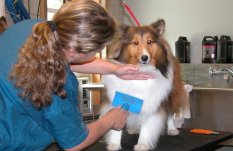
Excerpted from: Adopting a Dog
 There's much more to adopting a dog than finding a cute
furry bundle and bringing it home. One thing to consider
is the cost of keeping a dog healthy and happy. Even if
you already have a dog at home, it may have been years
since you've had to think about all the initial costs
of integrating your new friend into the family. Here's
a brief summary of costs to take into consideration.
There's much more to adopting a dog than finding a cute
furry bundle and bringing it home. One thing to consider
is the cost of keeping a dog healthy and happy. Even if
you already have a dog at home, it may have been years
since you've had to think about all the initial costs
of integrating your new friend into the family. Here's
a brief summary of costs to take into consideration.
ONE-TIME COSTS
Purchase price, adoption fee, or re-homing fee.
Spay or neuter surgery. "Fixing" your dog offers several health and behavior benefits, and ensures your pet doesn't contribute to the pet overpopulation problem.
Permanent identification. A tattoo and microchip are both recommended as ID for your dog in case he gets lost.
Initial shots/vaccines. Puppies in particular need additional vaccines to protect their immature immune systems.
Fencing. Although it's not a necessity, a fenced yard is ideal for dog owners. Dogs can be let out to relieve themselves without the owner having to go out with them. The yard also gives dogs a place to play and expend a little energy.
Socialization and obedience classes. Socialization classes give dogs the opportunity to interact with other dogs and people, so that they are comfortable with them. Obedience classes (teach people to) teach dogs what's expected of them as a good family member. It also helps people and dogs to form a stronger bond with one another by working together in a positive environment.
OCCASIONAL EXPENSES
Health issues or medication. Depending on where you live, your dog may have to be continually treated for heartworm, fleas and ticks, or you might only need to purchase these medications if you're traveling to an area where these pests are a problem. Dental care is also an expense to budget for. You can minimize the amount of dental work your dog needs by brushing its teeth regularly.
Emergency medical care. Dogs can get sick or hurt just like people can. Setting aside a little extra money every month can help to pay the bills if an emergency happens. Some pet owners purchase pet insurance for peace of mind. Make sure you read the fine print, though - pet insurance does not always cover what you think it does.
Dog supplies. This includes items like food and water bowls, beds and bedding, a kennel or crate, collar and leash. Supplies generally last a long time but eventually have to be replaced.
ONGOING EXPENSES
Food and treats. Bigger dogs tend to eat more than smaller ones, and thus cost more to feed.
Licensing costs. Most municipalities will require that your dog be licensed every year.
Regular vet check-ups. Adult dogs usually visit their veterinarians once a year to update their shots and get an overall health exam. It's sometimes recommended that senior dogs visit the vet twice a year for check-ups.
Grooming. This includes nail trimming, coat care, etc.
Boarding or travel costs. Some people will bring their pets on vacation with them (most pet-friendly accommodations charge an additional pet fee). Other people prefer to board their pets or hire a pet-sitter.
For more information on things to consider before adopting a dog, visit hubpages.com/hub/Adopting-a-Dog.
 Happy Holidays: Tips for Safe Travel With Your Pet
The holidays
Happy Holidays: Tips for Safe Travel With Your Pet
The holidays
 Why Regular Grooming is Important for Your Pet
Grooming your
Why Regular Grooming is Important for Your Pet
Grooming your
 Identification for Your Pet - Bring Him Home Safely!
Accidents can
Identification for Your Pet - Bring Him Home Safely!
Accidents can
 Improving the Lives of Homeless Pets
Thousands of
Improving the Lives of Homeless Pets
Thousands of
 Hiking and Camping With Your Canine Compadre
Some avid out
Hiking and Camping With Your Canine Compadre
Some avid out
Copyright © 2005-2016 Pet Information All Rights Reserved
Contact us: www162date@outlook.com